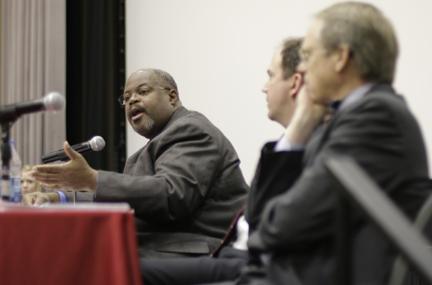
Tim O'Brien
Cash Michaels, a journalist for the Carolinian Newspaper and Wilmington Journal, speaks with a panel at F***!, Speaking Out for Free Expression, event in Witherspoon Campus Cinema Wednesday. Michaels shared experiences with freedom of speech working for radio station and newspaper media. Photo by Tim O'Brien
After two incidents of offensive speech in the Free Expression Tunnel, rallies in the brickyard and even media coverage, the Society for Collegiate Journalists decided to have an open panel discussion entitled “F***! Speaking out For Free Expression.”
Five journalists led the discussion on the issues involved with the Free Expression Tunnel. The program involved an introduction and ground rules, opening remarks, moderated questions, audience questions, final refection and closing remarks, all during which students heard different views about the issue.
Cash Michaels, editor, chief reporter and photographer for The
Carolinian Newspaper said the graffiti speech was a threat to society.
“It’s not free speech what they wrote. It is a threat. There are limits to freedom, but that is what allows us to be free, is to respect those limits. We know what lines to cross,” Michaels said.
President of the Society for Collegiate Journalists Helen Dear gave her own definition of free speech.
“Hate crime is a public activity. When you take it outside it becomes hate crime and not free speech,” Dear said.
Mike Tadych, a lawyer and former journalist, said there are better outlets to express one’s anger and frustration.
“The Chancellor’s office or Brickyard are places that you should be able to express yourself freely, not the tunnel,” Tadych said.
When asked if the University took the correct actions in response to the graffiti, the panel gave a plethora of answers. Cash said the University viewed the Free Expression Tunnel graffiti as a safety issue and it was covered up quickly for that reason.
“It was hypocritical. If it was viewed as ugly, hateful and threatening then why did the administration move with all deliberate speed to paint over it?” Cash said. “They started thinking about it in terms of their [university’s] own preservation. It was more of a safety issue.”
Nicole Burnette, a freshman in political science and criminology, said she was very upset by the behavior of the wall painters and that the wall should be eliminated altogether.
“I think it [Free Expression Tunnel] should be monitored and if it can’t be then it should be banned,” Burnette said.
Blake Burnette, a junior in engineering and the painter of the Kay Yow mural, said the people who committed these acts should have the integrity to identify themselves.
“I think they should do it with an open identity, don’t hide behind a mask of anonymity,” Burnette said.